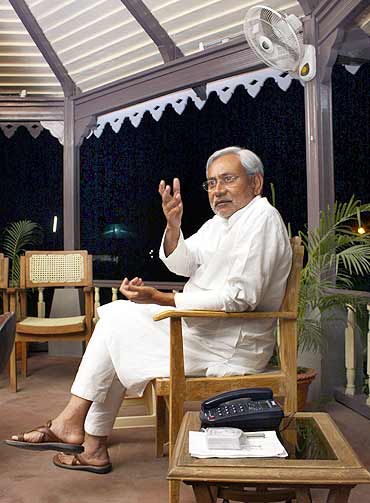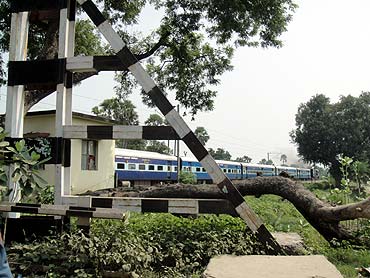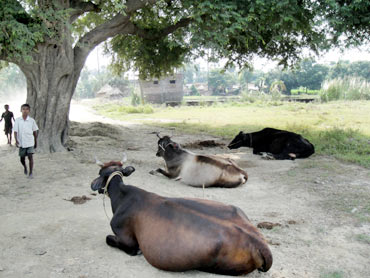 | « Back to article | Print this article |
'Nitish Kumar has to do everything himself'
After 15 years of governmental neglect which some feel took the state back by 40 years, Bihar is seeing a long-overdue recovery.
Widely lauded for his administrative initiatives and considered to be one of the country's most dynamic chief ministers, Nitish Kumar has almost single-handedly led the effort, but has also been criticised for overdependence on bureaucrats in the absence of a good second level of political leadership.
Prabhat Ghosh, director of the Asian Development Research Institute, a think-tank in Patna, tells Rediff.com's Archana Masih about Bihar's highly contested politics, the winds of change in the state and Nitish Kumar's strengths and weaknesses.
How is the politics of Bihar different from other states?
Bihar politics is highly contested politics. In Bihar even the Panchayat election is highly contested because mobilisation has taken place along caste lines, but has a class implication also.
Nothing much has happened in industry, but it does not matter. Many people have this wrong impression that industry is directly related to development, then how did Punjab, Haryana, western UP grow?
Industries came 20 years after agriculture development, for 20 years they made so much money from agriculture that they had to find place for new industry.
The Nitish Kumar government has brought optimism for the people of Bihar that the odds seem to be in his favour to win a second term. But one criticism against him is his over dependence on bureaucrats.
There is palpable optimism.
The average capacity of Nitish's MLAs is very low. Nitish is an engineer but he doesn't have the advantage of such good people in the second-third level of leadership.
He has to to do everything himself, in a sense it is good that he is taking all the initiatives, but in a sense it is bad.
What is the point in having a cabinet when he himself has to do everything?
There is a difference between taking initiatives and forming a team, he doesn't have a team and is singlehanded.
You cannot ensure good governance through bureaucracy alone. You have to have a party, a people's organisation.
The bureaucracy is the last resort. Lalu used to ignore bureaucrats, hence they think they should support Nitish.
'Lalu's contribution to social justice was substantial'
Lalu ruled for 15 years. His contribution to development was marginal or nothing at all. Bihar also had a problem of social justice.
The caste hierarchy was so overpowering that those who were in the lower order felt the pressure.
If you see Bihar politics in the last 50 years, the Socialist, Communist, other Left movements have always tried to address this issue of social inequality along with economic equality.
The previous regime was the first regime of the middle sections of society. Many people held power for the first time and saw this as a sort of liberation. The feudal upper caste forces were weakened.
But then they started feeling what was the use of this liberation from social oppression if it does not bring any material benefit, even if social oppression was less it did not bring employment, educational or health facilities.
People want to be free of oppression but also want grow and get material benefits.
Lalu's contribution to social justice was substantial, but his lapses in development were serious and the present CM is taking care of that.
What are the biggest factors unique to the politics of a feudal caste-ridden state like Bihar?
In the context of Bihar there are two agendas -- development and social justice. In fact, this is true for the entire country.
Maharashtra is one of the four richest states along with Punjab, Haryana and Gujarat. In spite of that, a large part of Maharashtra is as backward as Bihar and in some parts worse than Bihar because its land is not as fertile.
The development issue is largely addressed in Maharashtra, but the social justice issue isn't.
There should have been a similar movement there too, it is there in some form in the Republican Party of India.
'Caste is the axis of mobilisation for practically all political parties'
Prior to Lalu, neither of the two issues was addressed. Lalu addressed the social justice issue, people enjoyed it and then got fed up. Nitish, meanwhile, addressed the development issue.
Now whoever comes to power has to make a judicious combination of both development and social justice. If you only follow development then also you will suffer.
This government also did some reservation for the extremely backward class which is a social justice issue. They knew they have to address it.
No government will get full appreciation if you just do one of either.
What are the social justice issues that need to be addressed today?
There is a difference between making a place for disadvantaged people in the state assembly because there you have elections every five years. But a government does not only comprise of the state assembly, there are other sections -- the judiciary, bureaucracy, professionals, teachers etc.
For a section to feel that they are no longer oppressed they need to be seen in all sections of society.
Making space in electoral politics is very competitive, but it is also easy. It comes once in five years, but you can't make doctors out of the scheduled castes in five years.
This is what they will be discussing -- what amount of space are you creating for me to enter those areas where there is still dominance of the traditional powers.
'Bihar's agriculture should be one of the best in India'
The caste factor is not only in the minds of the people, but in the composition of the party.
Caste is the axis of mobilisation for practically all political parties. It will take us a long time to get over this, it is not peculiar to Bihar. Even in Maharashtra, Karnataka, West Bengal -- though it is not so loud, it does matter.
In Bengal the Communist party is dominated by the upper castes when they are just 15 per cent of the population. The Communists were in power for 30 years, why haven't others been educated and made it to their ranks?
Nitish Kumar has been praised for bringing in development in the state, but what areas have not been looked at?
We are lagging in industry, power, the public distribution system. The comparison is made with the immediate past.
When this government came in 2005, the immediate past was very problematic. It is not that the previous government did not do anything, it did something, but as far as development was concerned things were very bad.
The economy was functioning despite the government, it is in that situation that the new government took office.
Law and order improved -- if you see the statistics for theft, dacoity, rape, atrocities against women, the statistics may not be very encouraging, but the atmosphere is different.
In a state heavily dependent on agriculture, what new measures have been taken?
Lapses have been in industry, power and even agriculture. Even before this government even though governance was very poor, the agriculture situation was not very bad.
This is not because of the government but despite it.
Farmers make their own investment so the agricultural growth rate was not very bad in Bihar.
Our agriculture should be one of the best in India because this land is very fertile and there is abundance of water.
In spite of that only about 50 per cent of the net area is irrigated through assured irrigation which should be close to 100 per cent which is the case in Punjab, Haryana, parts of western UP.
'JD-U doesn't have a party structure'
I won't accuse the state government because it cannot do much in bringing industry. It is not a question of public investment any longer, you need private investment which will only come when you have the advantage of infrastructure which we don't have.
Or if you have the advantage of having a port -- like Orissa, a very backward state that has substantial number of industry because of its minerals and port.
It is difficult to get investment for landlocked areas. That is why western Orissa doesn't have industry, so does eastern Maharashtra even though it is a very advanced state.
In MP, barring Indore -- due to the history of the Holkar rulers -- the rest of the state does not have much industry.
The other area which are landlocked and still have industry is Delhi because it is the national capital.
The only way we can get industry in Bihar is when the state's agriculture economy prospers so much that people find it profitable to start an industry here.
Infrastructure is expensive and does not give immediate returns. In roads the state government has done work, but power is a serious matter and extremely expensive. They don't have the resources.
What about the long-pending land reforms in the state?
Land reforms will not be taken up because the present government which is in a coalition has feudal elements.
For land reform to be taken up, the state government should be absolutely free of feudal forces and have enough political capital.
Land reform will not be easy because you are going to disturb the most important and powerful man in the village. It is much less difficult to fight an assembly election than at the village level.
Nitish Kumar has been universally praised for the way he has pulled Bihar out of the black hole of no development, but sometimes it appears as if the chief minister's achievements have been overstated in the media.
The press is very friendly with this government because they thought whoever is an alternative to Lalu Yadav has to be supported.
I think there is some kind of overstatement in the press. There is exaggeration, but it is not false.
Things are definitely much better from what they were before, certainly his performance will count, but that is not the only thing that will matter.
One of the problems is that though the BJP has a party structure, the JD-U doesn't.
You need an organisation for converting your potential votes into real votes.
This government is very dependent on the bureaucracy and one of the allegations people make is that corruption is more. One hears of this, but it hasn't been proved.




